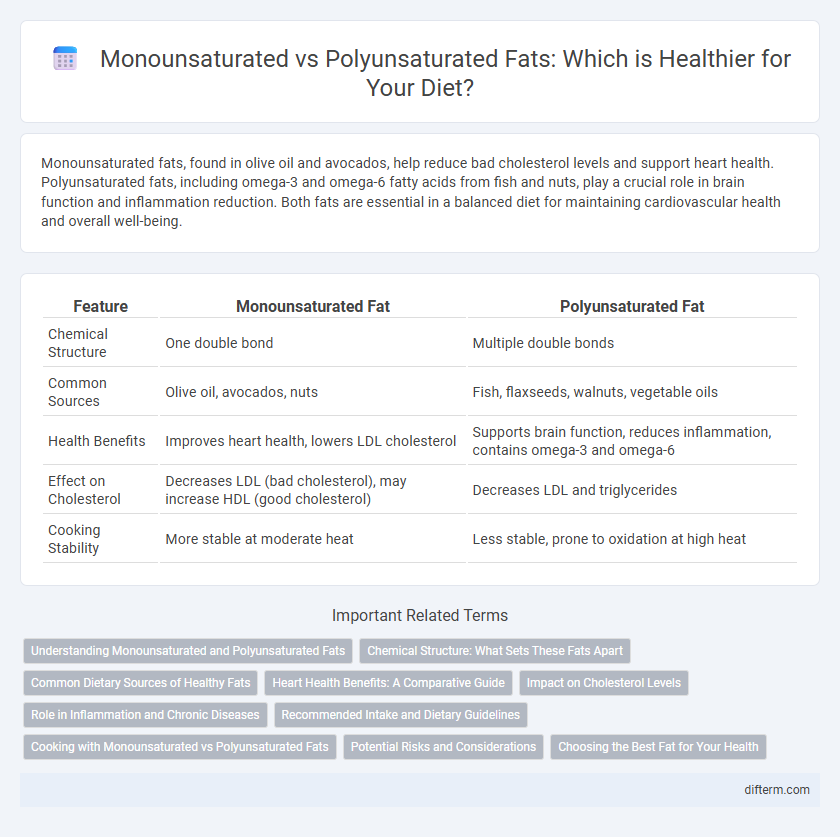Monounsaturated fats, found in olive oil and avocados, help reduce bad cholesterol levels and support heart health. Polyunsaturated fats, including omega-3 and omega-6 fatty acids from fish and nuts, play a crucial role in brain function and inflammation reduction. Both fats are essential in a balanced diet for maintaining cardiovascular health and overall well-being.
Table of Comparison
| Feature | Monounsaturated Fat | Polyunsaturated Fat |
|---|---|---|
| Chemical Structure | One double bond | Multiple double bonds |
| Common Sources | Olive oil, avocados, nuts | Fish, flaxseeds, walnuts, vegetable oils |
| Health Benefits | Improves heart health, lowers LDL cholesterol | Supports brain function, reduces inflammation, contains omega-3 and omega-6 |
| Effect on Cholesterol | Decreases LDL (bad cholesterol), may increase HDL (good cholesterol) | Decreases LDL and triglycerides |
| Cooking Stability | More stable at moderate heat | Less stable, prone to oxidation at high heat |
Understanding Monounsaturated and Polyunsaturated Fats
Monounsaturated fats, found in olive oil, avocados, and nuts, are key for reducing bad LDL cholesterol and supporting heart health. Polyunsaturated fats, including omega-3 and omega-6 fatty acids present in fatty fish, flaxseeds, and walnuts, are essential for brain function and inflammation reduction. Both fat types are crucial in a balanced diet to promote cardiovascular health and improve lipid profiles.
Chemical Structure: What Sets These Fats Apart
Monounsaturated fats contain one double bond in their chemical structure, creating a kink that affects their fluidity and stability. Polyunsaturated fats have two or more double bonds, making them more flexible but also more prone to oxidation. This structural difference influences their function in cell membranes and their impact on cardiovascular health.
Common Dietary Sources of Healthy Fats
Monounsaturated fats are primarily found in olive oil, avocados, and nuts such as almonds and cashews, contributing to heart health and improved cholesterol levels. Polyunsaturated fats, including omega-3 and omega-6 fatty acids, are abundant in fatty fish like salmon, flaxseeds, walnuts, and sunflower oil, playing a crucial role in brain function and inflammation reduction. Both fat types are essential components of a balanced diet, promoting cardiovascular and overall health when consumed in appropriate amounts.
Heart Health Benefits: A Comparative Guide
Monounsaturated fats, found in olive oil and avocados, improve heart health by reducing bad LDL cholesterol and increasing good HDL cholesterol, thereby lowering the risk of cardiovascular disease. Polyunsaturated fats, including omega-3 and omega-6 fatty acids from sources like fatty fish, walnuts, and flaxseeds, also support heart health by reducing inflammation and stabilizing heart rhythms. Both fat types contribute to lowering blood pressure and improving arterial function, but omega-3-rich polyunsaturated fats show stronger evidence in reducing heart attack and stroke risk.
Impact on Cholesterol Levels
Monounsaturated fats, found in olive oil and avocados, help reduce LDL cholesterol while maintaining or increasing HDL cholesterol, promoting heart health. Polyunsaturated fats, especially omega-3 fatty acids in fish and flaxseeds, effectively lower LDL cholesterol and triglycerides, reducing cardiovascular risk. Both types of fats improve cholesterol profiles but through slightly different mechanisms impacting lipid metabolism.
Role in Inflammation and Chronic Diseases
Monounsaturated fats, found in olive oil and avocados, have anti-inflammatory properties that may help reduce the risk of chronic diseases such as cardiovascular disease and type 2 diabetes. Polyunsaturated fats, especially omega-3 fatty acids present in fish and flaxseeds, are well-known for their potent anti-inflammatory effects and ability to lower markers of inflammation like C-reactive protein. Both types of fats contribute to improved heart health, but omega-3 polyunsaturated fats exhibit stronger evidence in mitigating chronic inflammation linked to autoimmune disorders and metabolic syndrome.
Recommended Intake and Dietary Guidelines
Monounsaturated fats, primarily found in olive oil, avocados, and nuts, are recommended to constitute about 15-20% of daily caloric intake to support heart health according to dietary guidelines. Polyunsaturated fats, including omega-3 and omega-6 fatty acids present in fish, flaxseeds, and walnuts, should make up approximately 5-10% of total calories to reduce inflammation and improve cholesterol levels. The Dietary Guidelines for Americans suggest replacing saturated fats with these unsaturated fats for optimal cardiovascular benefits.
Cooking with Monounsaturated vs Polyunsaturated Fats
Cooking with monounsaturated fats, such as olive oil and avocado oil, offers stability at moderate heat due to their higher smoke points and resistance to oxidation. Polyunsaturated fats found in oils like sunflower and flaxseed are more prone to oxidation and nutrient degradation when exposed to high heat, making them better suited for dressings or low-temperature cooking. Choosing oils rich in monounsaturated fats can enhance heart health while preserving the integrity of nutrients during sauteing or roasting.
Potential Risks and Considerations
Monounsaturated fats, found in olive oil and avocados, may increase LDL cholesterol if consumed excessively, whereas polyunsaturated fats, rich in omega-3 and omega-6 fatty acids from fish and nuts, can contribute to inflammation if imbalanced. Excessive intake of omega-6 polyunsaturated fats may promote pro-inflammatory effects, potentially raising the risk of cardiovascular disease. Careful balance between monounsaturated and polyunsaturated fats is crucial to minimize potential risks like oxidative stress and impaired lipid profiles.
Choosing the Best Fat for Your Health
Monounsaturated fats, found in olive oil, avocados, and nuts, support heart health by improving cholesterol levels and reducing inflammation. Polyunsaturated fats, including omega-3 and omega-6 fatty acids found in fatty fish, flaxseeds, and walnuts, are essential for brain function and cell growth. Balancing monounsaturated and polyunsaturated fat intake while limiting saturated and trans fats promotes optimal cardiovascular health and overall well-being.
Monounsaturated fat vs polyunsaturated fat Infographic

 difterm.com
difterm.com